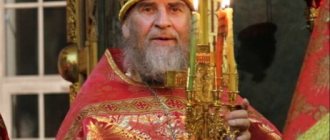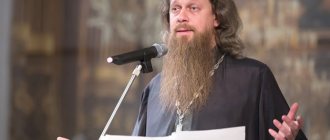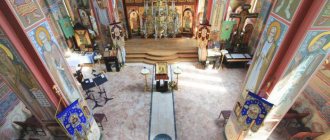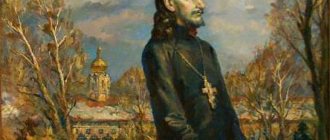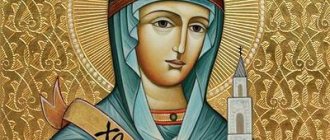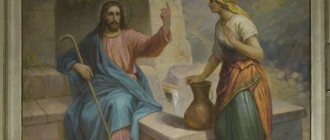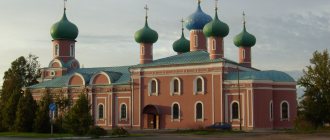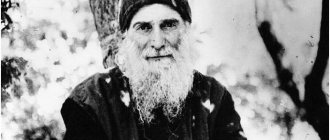In the city of Ivanovo, in its very center, stands a large old red brick church, surrounded by numerous intricate buildings. Today there is the Vvedensky Convent for women, and once upon a time, during the years of Soviet power, this wonderful temple was adapted for the State Archive.
At that time, it seemed unthinkable to return the cathedral under the wing of the Russian Orthodox Church. Believers wrote to different authorities - everything was useless. A miracle happened when Archimandrite Ambrose (Yurasov) got down to business.
The story of the discovery of the Vvedensky Church is one of the bright and at the same time tragic pages in the difficult life of a priest, and in our article we will cover this event in more detail. We will also tell you about the biography of Father Ambrose, about his tireless preaching and educational activities in the name of the glorification and triumph of the Orthodox Faith.
Ambrose (Yurasov): biography
The future priest was born in the Altai Territory, in the village. Lights in 1938 in a poor peasant family with many children. The parents were very religious people; they were able to instill in their son a passionate love for God from an early age. The boy's father died in the war in 1941, and the Lord gave his mother a long life. Shortly before her death, she accepted the Great Schema. Father Ambrose knew hunger from childhood and saw persecution of Orthodoxy. As he grew older, he entered the mine as a worker, then served in the army and went in for sports.
The young man was surrounded by atheists. It would seem that in such an environment it was difficult to maintain faith, nevertheless, the young man entered the Moscow Theological Seminary and successfully graduated from it, receiving a candidate of theology degree. From 1965 to 1975, the priest served in the Trinity-Sergius Lavra, where he subsequently took monastic vows and was ordained as a hieromonk.
In 1976, Fr. Ambrose was transferred to the Pochaev Lavra and elevated to the rank of abbot. He stayed there for 5 years and all these years he was engaged in quiet, humble service to God: he confessed to the monastery brethren, preached and conducted excursions for visitors. But times came hard: the authorities threatened to close the Lavra and evict the monks. With the blessing of his confessor, Abbot Ambrose (Yurasov) is hiding from persecution in the Caucasus Mountains, where he lives a prayerful and hermitic lifestyle.
Archimandrite Ambrose Yurasov's father died at the front, and his mother accepted the great schema before her death.
Archimandrite Ambrosy Yurasov was born
Archimandrite Ambrose (in the world Yurasov Alexander Ignatievich) was born on September 8, 1938 in the village of Ogni, Altai Territory. His family is peasant, large, and deeply religious. His father, Alexander Ignatievich, died in September 1941 at the front of the Great Patriotic War. The mother lived a long time. All her life she zealously served the Lord and before her death she accepted the great schema.
There is information that Father Ambrose also had a brother and sister. Alexander Ignatievich graduated from school, then worked in a mine. He served in the army, went in for sports and especially boxing. All this time he was surrounded by atheists.
Komsomol members were assigned to the deeply religious young man. Their task was to turn the guy away from faith. However, everything happened the other way around: under the influence of the “watchmen,” the future archimandrite decided to enter the theological seminary.
RGAKFD/TASS. An atheist schoolboy writes on the board the names of people who were in church at Easter. Saratov region, 1928. Despite the fact that atheist Komsomol members were assigned to Alexander Ignatievich Yurasov, he decided to receive a spiritual education
There is no doubt that, in addition to the desire to resist the atheists, this decision of the future archimandrite was influenced by the position of his mother. She always supported his desire for God. With such support, Alexander could fight any temptations and temptations in the world.
Foundation of the Holy Vvedensky Convent in Ivanovo
In 1983, Father Ambrose was enrolled in the Ivanovo diocese. His first parish was the village of Zharki, remote from the center, where there were only five houses, then the priest served in the village of Krasnoe near the famous Palekh. And then the time came when he was elevated to the honorary rank of archimandrite and assigned to a new place of service: the Transfiguration Cathedral in Ivanovo.
Archimandrite Ambrose (Yurasov) quickly won the love of the parishioners, of whom there were generally few even in the regional center, because godlessness reigned in the country. But still, a circle of true believers rallied around the priest. Together they decided to win back the “Red Church” (the popular name for the Holy Vvedensky Cathedral) from the atheists.
At first, the priest and his parishioners got down to business peacefully: they wrote, went with requests to government officials, but they soon realized that all this was useless. Someone else would be in Fr.'s place. Ambrose gave up and despaired, but he decided to go to the end.
One morning, surprised residents of Ivanovo saw a tent near the “Red Church” and four women in monastic robes sitting next to them. These were the spiritual children of Father Ambrose, whom he blessed to go on a hunger strike in protest against the arbitrariness of the authorities. For that time this was an unprecedented step! The whole city was buzzing, newspapers and radio were throwing mud at Father Ambrose, the temple was cordoned off by police cordons. From all over the city people flocked to the church to look at the courageous women. The protest lasted 16 long days and attracted the attention of the world community.
Ultimately, the Red Church was returned to the Ivanovo diocese, and Archimandrite Ambrosy (Yurasov) became rector of the new church parish. On March 27, 1991, with the blessing of Patriarch Alexy, the Holy Vvedensky Convent was founded here. Father Ambrose became his spiritual leader and mentor. Over time, the monastery grew, the number of sisters grew to one and a half hundred. Father Ambrose still leads this monastery.
Essays
The Ivanovo Vvedensky Monastery published 10 books by Archimandrite Ambrose:
- Like God is with us
- Orthodoxy and Protestantism
- Confession: To help the penitent
- Word of comfort
- In the name of the Father and the Son and the Holy Spirit
- During the days of fasting
- About faith and salvation. Questions and answers
- Vocation
- Monastery
- God bless
In the books about. Ambrose there are strange opinions. So, for example, advocating the need for men to wear a beard, he writes: “ There is such a tree - larch, it has needles instead of leaves. Spruces and pines also have the same needles. Energy descends to the earth through them. And men need a beard to drain energy...
» [8].
Father's social activities
Today, the sisters and clergy of the monastery carry out extensive public activities: they visit drug centers and prisons, publish religious literature, speak on the Orthodox radio station “Radonezh”, feed homeless people, the disabled and orphans, and work on the city “Helpline”. And Father Ambrose (Yurasov) leads all these efforts with patience and love.
The priest’s sermons are so popular that pilgrims come from all over Russia to listen to them. And although the Father is an extremely busy person, he still finds time to receive and listen to people, help with advice, and give consolation.
Where is Elder Ambrose?
Elder Ambrose Yurasov is in the Holy Vvedensky Convent.
The history of this monastery in the city of Ivanovo is unusual. During Soviet times, the building housed an archive. They tried to return it to the Orthodox Church for a long time, beating the thresholds of various authorities. In 1993, the spiritual children of Father Ambrose decided to take a desperate step to win it back from the authorities. Four women went on a hunger strike at the temple, with the blessing of the priest, which lasted more than two weeks. As a result, the church was returned to the Diocese.
Father Ambrose and sisters help the most disadvantaged. They visit the nearby women's colony, which is jokingly called another courtyard at the monastery. Father Ambrosy Yurasov confesses and gives communion to convicts, and supports the construction of prison churches. It also helps after release: for some with employment, for others with good advice.
Residents of the monastery and its abbot visit drug centers and wards for tuberculosis patients, feeding people left homeless. They have disabled clients who have not left their homes for years. They are regularly taken out for meetings and church services. Archimandrite Ambrose visits the children in the orphanage. He is a confessor at the Council of Veterans of the Ministry of Internal Affairs. The sisters receive calls for help on the city helpline.
Father Ambrosy Yurasov is a talented writer. The number of printed copies of his books exceeded a million. In 2011 he was admitted to the Russian Writers' Union.
How to get an appointment with Father Ambrose?
This is how the nuns of the monastery speak about their shepherd: “warmth emanates from the priest.” Both young and old come to him with their troubles. The monastery welcomes Orthodox people from all over Russia, who come to attend sermons. Despite his age and busyness, Father Ambrose tries not to refuse to help those in need with a kind word.
You can get an appointment with the priest at the address: Ivanovo, Basic Street, 23 with our help thanks to a trip to.
When it is important to get to the elder as soon as possible, we can take you to the priest and you will see him on the same day. Read more about this.
Attention! Money cannot buy the turn or reception of any of the Elders!
During the Soviet era, Orthodoxy in Russia was in a difficult situation. The communists destroyed or closed most of the churches and monasteries. Only true ascetics with strong faith in God and strong in spirit could revive everything that was destroyed.
One of these ascetics was Elder Ambrose (Yurasov). He was able to found a convent in Ivanovo, which in the 90s of the last century became a landmark event in the history of Orthodoxy.
How was the day of Father Ambrose of Optina?
Today we celebrate the discovery of the relics of Elder Ambrose
, inhabitant of Optina Hermitage. Why do they love the holy father so much? How was his day at the monastery? And what wisdom did he impart shortly before his death?
The elder's day began early, at four in the morning (lately at five), when he rang the bell. At this ringing, cell attendants came and read him the morning prayers, the twelve psalms and the first. The elder listened to the reading either standing on his bed, or sitting on it, and when his health deteriorated, even lying down, but he never omitted the rules.
Elder Ambrose
Evgeniy Poselyanin
285 RUR
Then, after a short rest, the third and sixth hours and the canon with an akathist to the Savior and the Mother of God were read. The elder listened to these hours, usually set for vespers, in the morning, since he had no time to attend vespers with his cell attendants due to the many visitors. During the rule, stops were made. Having listened, the elder sent out his cell attendants and, having rested, called them again to continue. One might think that the point here was mainly not the elder’s fatigue, but that he wanted to concentrate alone in mental, that is, internal, prayer.
After listening to the morning rule, the elder usually washed himself. And at this time, the cell attendants began to question the elder on behalf of various persons.
This early morning hour of getting up was difficult for the overtired, weakened old man. Often he would say: “Oh, everything hurts!”
Then he was served a small cup of cocoa with a tiny piece of bread, and then two cups of weak tea. At this time, the elder began to dictate letters. While the letters were being dictated, visitors were already beginning to gather, and a knock on the outer door or a bell was constantly heard, and annoying demands were made on the cell attendants to quickly report to the elder, and then a murmur was heard that the elder was not accepting. Meanwhile, having dictated the letters, the elder, preparing to go out to the visitors, changed his clothes and shoes, and questions were constantly heard from the monks who dressed him and other monks who entered him, and a lively general conversation was conducted.
At about ten o'clock the elder came out to see the visitors and first of all went along the corridor, where he blessed those who came, speaking a few words each, and with whomever was necessary, he worked longer in the reception room. Then he went to the shack and stayed here for a long time. The difficult and painful side of old age is that people go to the old man not only with important and necessary matters. Others resort to all sorts of nonsense and waste time by talking about some of their imaginary misfortunes. Of course, most often it is women who are so annoying.
At noon or a little later, the elder went to have lunch in Fr. Joseph and reclined while eating. This meal usually consisted of two dishes: low-fat fish soup and cranberry jelly, along with bread. During fasting, instead of fish soup, potato soup with thin buckwheat gruel was served.
The old man took as little food as a three-year-old child could eat. At 10–15 minutes, lunch ended, interrupted by questions from cell attendants about what to answer to such and such people. Sometimes, to clear his head, the elder ordered him to read something out loud to himself, for example, several of Krylov’s fables. He loved them, and a book of these fables always lay on the table in his cell room.
Then the elder, immediately lying on his bed, received first the men, then the women, for the general blessing. At the same time, the elder, with a well-aimed word, casually spoken, often gave an answer to a secret, unspoken question by someone, or told some story that served as an explanation to someone’s also unspoken bewilderment. Sometimes some kind of joke was said, and finally, having given a blessing to each or every one, the elder headed towards himself, and voices were heard: “Father, father, I should say a word, I should have a few words!” But, having squeezed through the crowd, the elder locked himself in his cell.
If after dinner the elder was able, he went out to the hut for a general blessing. The cell attendant appeared and closed the windows so that there was no through wind; the visitors stood in two lines, forming a passage for the elder, the door opened, and Fr. appeared in the passage. Ambrose in a white robe, on top of which he invariably, winter and summer, wore a fur duckweed, and a cotton wool hat on his head. Stopping on the step, the elder always prayed in front of the icon of the Mother of God and walked further, carefully peering into the faces and making the sign of the cross. Questions were heard from the crowd, to which he gave simple, clear answers. Sometimes he would sit down, and then they would kneel around him, catching his every word, and he would tell something that contained useful instruction.
When the cell attendant reminded him that the hour of rest had come, he, taking off his cap, bowed and said in a joking tone: “I am very grateful to you for your visit. Father Joseph says it’s time.” In the summer, the “general blessing” took place in the open air. From the porch of the shack, poles to posts were arranged. On one side stood the people, on the other, a bent old man moved, giving answers to people’s questions.
How often the elder, when receiving people, became extremely exhausted, this can be seen from his letters. “In the mornings I can hardly get up to the usual verbiage with visitors, and then I talk so much that it takes me an hour or more to barely get to bed. There is a proverb: “No matter how you throw it, everything comes out.” It’s impossible not to accept, but there’s no way to accept everyone and there’s not enough strength.”
Barely catching his breath from fatigue, he walked to his room; a commotion arose, people grabbed at him, and he sometimes got out of the crowd, leaving a warm cassock in her hands. Sometimes the elder did without an afternoon rest at all, calling the clerk to him and dictating letters. At about three o'clock the reception began again: he either went out to the reception room, or, lying on a bed in Fr. Joseph, talked with the people; During this reception he drank tea. At eight o'clock there is dinner (a repeat of lunch), and then there is another reception.
In the winter, visitors, sometimes entering the elder’s room unwarmed, would catch a cold, and by the evening he would feel ill. In the evening, the cell attendants again read prayers to him, barely able to stand on their feet from incessant running throughout the day. And the elder himself at that time, after a day of work, lay on his bed almost unconscious. So the time reached past midnight. Slept o. Ambrose is always dressed - in a robe in summer, in a leather cassock in winter, with a monk's cap on his head, with a rosary in his hands. He certainly didn't sleep much that night. Of course, only at this time could he freely delve into prayer.
The whole world is sleeping, those who have laid down their sorrows and sins during the day in this cell are sleeping. Only the great old man does not sleep, and who knows what mysteries he sees, what fragrant incense his prayer rises to heaven! The usual, strictly observed course of the life of Elder Ambrose was diversified by some changes on holidays.
On the eve of Sundays and holidays, all-night vigils were held in the elder’s cells. So as not to increase the heat of the cramped rooms, two or three singers and sick hermits who took advantage of the opportunity stood in the corridor and the entrance hall, and in the cell itself, for the most part, only the serving hieromonk and the elder himself stood.
Due to many matters, it was impossible for him to listen to the service calmly. During the readings of proverbs, kathismas, and the canon, I had to go into Fr. Joseph to confess or receive visitors. But he always listened with concentrated attention to the Six Psalms, the Gospel and the Greatness, during which he loved to sing along in his pleasant tenor voice. Sometimes it happened that the time to “Praise” came, and the elder had not yet had time to dismiss the visitor, and then the service was interrupted to wait for the elder. During the main, touching moments of the service, tears were visible on the elder’s face.
On the morning of holidays, having gotten up at 5 o'clock, the elder sent his cell attendants to mass and until they arrived he was left completely alone and it was unknown what he was doing there. Returning from church, the cell attendants found him sitting on his bed reading his favorite books: the Apostle, the Psalter, the Philokalia, St. Maximus the Confessor or Isaac the Syrian - all in the Slavic language, since he loved this language very much. In his books, he emphasized many passages or made his own comments.
But the festive silence did not last long. The elder began to dictate letters, and then visitors would arrive, and there would be knocking, ringing, noise and murmur all day long. There were even more visitors on holidays than on weekdays. Before the holidays of Easter and Christmas, the elder composed the so-called “general congratulations.” Unable to congratulate all his spiritual children separately, from 1869 he began to dictate in advance an edifying general letter applied to the holiday. All of them were subsequently collected and published by Optina Pustyn.
On the eve of great days, which all Orthodox Christians love to celebrate at home with their families, the number of visitors decreased significantly. The elder was in a particularly joyful, tender mood, so that his kindness brought tears to those around him. Matins was served at midnight, and on the next day of the holiday the Optina abbot came with congratulations.
A great celebration took place on December 7, the elder’s name day - the memory of the great Saint Ambrose of Milan, whom the elder greatly revered. The Optina rector served in the skete church and from mass with the entire monastery he came with congratulations to the elder, who was sitting in his usual, sometimes patched, cassock on a bed with his legs drawn up. Visitors were given tea, there was “great consolation” at meals, both monastic and monastic, and in the elder’s reception room there was a snack for the leading officials. Cartloads of white bread and pies were sent to the Belevsky Convent for this day.
Of the writers they knew Fr. Ambrose M. P. Pogodin, F. M. Dostoevsky, Vl. S. Solovyov, K. N. Leontyev, Count L. N. Tolstoy, whose sister was a monk in Shamordin. Dostoevsky was in Optina, it seems, at the same time as Vl. S. Solovyov. I happened to hear the latter's story that
when Dostoevsky wrote the Karamazovs and the plan of the novel required him to portray a monastery elder, he went to Optina and talked with Fr. Ambrose. Father Ambrose comprehended the essence of the writer’s humble soul and spoke of him: “This is a penitent.”
But it is completely wrong to think that Fr. Zosima, created by Dostoevsky after visiting Optina, is an artistic reproduction of the personality of Fr. Ambrose. Fr. Zosima is much more like a Protestant pastor than the rich, colorful, versatile and not at all sentimental type that Fr. Ambrose.
Fedor Mikhailovich Dostoevsky
It was mentioned above about the elder’s appearances at the “general blessing” and his conversations at this time, where he often, in a sometimes humorous form, expressed extremely deep thoughts. The elder undoubtedly had artistic abilities, since many of his comparisons are simply amazing in their originality and expressiveness. Much of what he said at these “general blessings” was then written down and subsequently collected.
“We must,” said the elder, “live on earth as a wheel turns: just one point touches the ground, and the rest certainly tends upward. And as soon as we lie down on the ground, we can’t get up.”
This is how the elder taught the nuns how to treat the sisters: “If someone has offended you, do not tell anyone except the elder, and you will be peaceful. Bow to everyone, not paying attention to whether they bow to you or not. You have to humble yourself in front of everyone and consider yourself worse than everyone else. If we didn’t commit crimes, it might be because we didn’t have the opportunity to do so—the situation and circumstances were different. There is something good and kind in every person; We usually see only vices in people, and see nothing good.”
About how a person becomes arrogant in happiness, but sinks to the ground in grief, the elder spoke the following artistic parable: “A man is like a beetle. When it’s a warm day and the sun is shining, he flies, is proud of himself and buzzes: “All my forests, all my meadows! All my meadows, all my forests! And as soon as the sun disappears, the cold breathes and the wind starts blowing, the beetle forgets its prowess, presses against the leaf and squeals: “Don’t knock it off!”
Just as people do not know how to forgive their enemies, and if they do not take revenge on them, then they usually try to annoy them with at least something petty: to assume a proud look when meeting them, not to notice. And the elder said: “You need to force yourself, albeit against your will, to do some good to your enemies, and most importantly, not take revenge on them and be careful so as not to somehow offend them with the appearance of contempt and humiliation.”
But with what not only condescending, but also affectionate love one must treat those who judge. When one person asked the elder how it was that he not only did not get angry with those who condemned him, but also loved them, he answered with a laugh: “You had a little son. Were you angry with him if he did or said something wrong? Didn’t you, on the contrary, try to somehow cover up his shortcomings?”
How differently and mostly imperfectly the words are interpreted: “Be wise as a serpent” - and how deeply the elder interpreted it! “A snake, when it needs to change its old skin for a new one, passes through a very tight, narrow place, and in this way it is convenient for it to leave its old skin. Likewise, a person, wanting to remove his old age, must follow the narrow path of fulfilling the Gospel commandments. During any attack, the snake tries to protect its head. A person must protect his faith most of all. As long as faith is maintained, everything can still be corrected.”
You will find more amazing evidence of the life of the holy elder Ambrose of Optina in the book
“Elder Ambrose” .
Advice to abbesses and confessors
- Father, you have been professing for 44 years - what advice can you give to the abbess who have just been appointed to manage monasteries and to the confessors who have been appointed to care for women’s monasteries?
– What is the most important thing for the abbess? She should not consider herself a mistress, as if she has received some kind of special power. All power is in the hands of God. And the more a person receives spiritual power, the more humble he should be and consider himself worse than everyone else.
I remember Mother Varvara, the abbess of the Pukhtitsa Monastery. I once watched how she treated everyone. The sisters come up to her - she calmly talks to them, gives them obedience. Pilgrims come, approach her and ask for a blessing, or if they brought her something as a gift - she will talk to them and console them. She spoke calmly and evenly to everyone. With her spiritual life, she passed on this spirit to everyone - both her sisters and pilgrims. Thank God she lived to be 81 years old.
The confessor, if he himself has already gone through monastic life, during confession, let him listen to everything, all the pain that the sister says. If you simply told your thoughts or carried out some things in deeds, then you don’t need to immediately demand: “How dare you do this? This cannot be done!” We must lovingly accept and forgive. If she asks for instructions, it means that she must give and suggest how to recover from sin. If she often falls into condemnation, then we must tell her that she should not walk around her cells, because this will result in idle talk, and then condemnation will certainly come. If she came to her sister to pray, or to talk, to be comforted, this is allowed. And there is no need to walk from cell to cell idle.
The beginning of spiritual life, the holy fathers said, is if a person sees in his soul the abyss of sins. Seeing yourself as the most sinful person and considering yourself worse than any creature is a normal state. When a person is in vanity, in pride, this is a dangerous path. You don’t need to rely on yourself, but only on God.
- They say that under the confessor and the abbess there may be an erroneous dual power in the monastery. What should be the right relationship?
“If the confessor created the monastery and he gathered all the sisters and built the monastery himself, then, of course, the mother should obey the confessor and should not do anything without his knowledge. Then everything will be fine. And if she “seizes” power from the priest and decides that she is the only mistress of the monastery, then that’s it, it’s a disaster. We must maintain this obedience until death.
– What if the confessor is not the founder, but simply appointed?
– If appointed, then serious issues need to be resolved together. But it also happens that there is only one abbess, but several priests can be sent.
I know that in one monastery young priests come in a suit, change into a cassock, go out, they confess to the mothers at the service, they confess to the people, the service is over - they take off their cassock, put on their suits and go. Therefore, of course, there must be reasoning.
Mutual understanding between the confessor and the abbess is necessary so that there is no conflict among the sisters in the monastery.
– It is much easier to assemble a monastery than to hold it later. There are monasteries from which they flee, and there are those that they strive to come to. Why?
– If you create a soldier’s life in a monastery and live “according to the letter,” then people will not be able to stay there. A novice comes from the world - she should not immediately fall under the requirements that were for ancient monasticism, because she will not immediately meet them.
As some literalists say: a novice has come - she must only sit in her cell and only go to services, conduct obedience, not talk to anyone, not communicate. This cannot happen, because a novice has come, and she must meet everyone - these are her sisters. Sisters communicate, get to know each other - they become family.
The entire monastery is like sisters in spirit, it’s like a family. If you suddenly had to leave, then this novice is already suffering, she wants to go back - she misses the monastery.
- Father, some say that in a convent the confessors should be from the “white” clergy - married priests, while others say that no, the confessors should be monks, since a monk will understand a monk better. And at the Holy Council of the Russian Orthodox Church in 1917-1918. decided: “In women’s monasteries for mantean nuns, a confessor is appointed from among the monastics...”
– Some novices from other monasteries came to us. One, from a monastery where the priest was from the white clergy, said that she once shared her experiences with him: “Father, unclean, dirty thoughts came to me.” Instead of calming her down, he began: “Why did you come to the monastery? Go out into the world, find a man and be calm.”
And another one also told me - she repented of her prodigal thoughts, but the priest does not understand, cannot understand, he tells her: “It’s interesting, I lived with my mother for 30 years - there are no such thoughts. And they live in a monastery, and some prodigal thoughts come to them.”
Of course, in the absence of a confessor, in extreme cases, you can invite a lay priest to become a confessor if there is no one else, but if there is a confessor-monk and this suits the monastery, let him live in the monastery.
You need to have reasoning in everything. Literalism is bad. It is not for nothing that the holy fathers say: “It is better to sin in mercy than in severity.” You need to know this too.
– Should the confessor retell to the abbess how her sisters live - their sins?
- Take any confessor who lives in a monastery - he must maintain the secret of confession. There is no need to reveal the sins of the sisters to the abbess.
– How to deal with confession of thoughts if the confessor is rarely in the monastery or is not there at all?
– If a sister has thoughts and there is no confessor, she can tell mother, but mother must accept this as a revelation of thoughts.
And it happens like this - the abbess discovered a thought, for example: “Here, mother, thoughts have come to you that you are very proud and very impudent.” She accepted this, and a few days later she sent this sister to the compound. This is a disease of the abbess's soul.
On the contrary, one must love a person more for his revelation. Thoughts are from the enemy! This way you can disperse everyone. On the contrary, you need to cover it with love, give it chocolate, or jam, honey, and comfort the person thoroughly.
– What if the abbess shows her disrespect for her confessor in front of the sisters?..
“She needs to repent of this so that she doesn’t take on too much power.”
Why are temptations needed?
– Every monastery has its own temptations, just as every family has its own problems. We call monasteries “saints” - why do there be troubles in monasteries?
– There must be temptations. If there is no movement in the river, then the water in it goes dark, turns green, becomes overgrown with grass, and frogs appear there. Also in a monastery - if everything around a person is always calm, even, quiet, passions arise in a person, and it is very difficult to eradicate them - he does not notice them.
Water flows from the mountains, a waterfall - it is always fresh and very healing. Likewise, a person living in a monastery must go through everything - insults, reproaches. Sometimes such trials happen inside the monastery - the Lord allows temptations, they also come from the authorities, even from the spiritual authorities. This has been the case at all times in the history of the Church; in all monasteries there have been one temptation or another.
For example, the Monk Ambrose of Optina - they put pressure on him, they said that you cannot work at the Shamordino monastery, you are a monk, you should only pray. They scared me with the bishop. And he answered: above every bishop there is a supreme bishop - God.
The Monk Seraphim of Sarov had a similar temptation when he created the Diveyevo Monastery: they also frightened his sisters, they said that they would close the monastery. The Metropolitan went to close it, reached the middle of the road - an attack.
The Lord protects, but there may be temptations.
You need to set yourself up so that you accept everything as from the hand of God and not be indignant at anything. Say to yourself more often: God allowed this, it means it’s necessary, everything will be fine, the Lord will cover it all, everything will pass, everything will fall into place. And you look - everything fell into place.
The Lord does not allow anyone beyond his strength. Everyone can do it. And we must learn to thank God for every day lived in the monastery.
– They complain that sometimes the abbot or abbess deliberately gives obedience beyond their strength. What to do in this case?
– If a monk has been given some difficult obedience, and he cannot bear it, then he must come and tell the abbot that this obedience is beyond his strength. If the abbot says that you need to continue, and you die in obedience, you will be like a martyr. But you need to understand that obedience, prayer, bowing, fasting are not the goal. These are crutches. And the goal is to learn humility.
– You are a graduate of a men’s monastery and the founder of a women’s monastery. Are there significant differences between nunneries and monasteries?
- Men are stronger - they don’t give in to little things, they rarely get discouraged. In a conflict situation, they may argue, but they quickly reconcile and remain calm.
There are more small things in the nunnery. Everything is built on emotions. Something happened in the monastery, maybe an ordinary temptation, like a “broken telephone” - everything was turned upside down. There is resentment towards each other: “I do more than the other.”
One day a journalist from St. Petersburg said to me: Father, how do you deal with the mothers in a convent, because women’s nature is one of hysterics and despondency. I answered: only the grace of God preserves us.
The convent is more sensitive and reacts to everything very subtly.
– What advice do you give to sisters?
– You need to be able not to take too much into your head, not to take everything to heart, to distinguish between thoughts.
Thoughts can be human, angelic, and demonic. Prepare dinner, clean the cell, go to your sister and help her if she is sick - these are human thoughts. Angelic - to pray, to be patient with your neighbor, to repent of all sins, not to be irritated, not to be offended, to tolerate everyone and everything. Especially if someone has offended us, we must be the first to ask for forgiveness and reconcile. This is very valuable.
And demonic thoughts are frequent. How to recognize them? The following thought came to you - if you accept it as truth, you will immediately become upset, become despondent, melancholy or irritated.
When a person constantly reads the Jesus Prayer, he understands that the Lord is always with him. Any temptation will come - he immediately remembers that this is the will of God, which means it must be so. Everything the Lord does is for the good. If you set yourself up this way, there will be peace in your soul.
Radio "Radonezh" is another brainchild of Archimandrite Ambrose
Another project in which Archimandrite Ambrosy Yurasov took an active part is Radio Radonezh. This is the first independent Orthodox radio station in Russia. It acts as the voice of the Russian Orthodox Church in Russia and abroad.
Archimandrite Ambrose in the studio of Radio Radonezh. Father Ambrose is a regular participant in radio programs. He answers questions from radio listeners, participates in debates, and gives sermons.
The radio station was created with the blessing of His Holiness Patriarch of Moscow and All Rus' Alexy II. She broadcasts on VHF waves. In Moscow it is 72.92 MHz. In addition, it also broadcasts on AM 612 kHz for four hours a day from 19.00 to 23.00. Today, the audience of Radio Radonezh is 20 million listeners.
Father Ambrose is a regular participant in Radio Radonezh broadcasts.
Father Ambrose actively participates in conversations, lectures, open broadcasts and discussions that are heard on the radio station. He preaches on air, answers questions from listeners, and gives explanations on certain issues.
Video: “How to be saved in the world?” Radio "Radonezh". Archimandrite Ambrose (Yurasov) and nun Joanna (Smirnova). Akhimadrit Ambrose answers questions from radio listeners.
Many listeners specifically turn on the radio solely to listen to the priest. This makes it not only popular, but also allows it to convey the Word of God to the maximum number of people as accurately and accessiblely as possible.
It should be noted that there are very few radio preachers in the Russian Orthodox Church, since speaking on the radio requires a special talent.
One of the founders of the Orthodox society "Radonezh" was Archimandrite Ambrose
Father Ambrose has always enjoyed authority in the circles of the Orthodox Russian intelligentsia. One such circle in 1987 gave impetus to the creation of the Orthodox society (brotherhood) “Radonezh”. This is a public organization and it acts as a brotherhood of the Russian Orthodox Church.
Conference “New routes of religious tourism”. The Orthodox society "Radonezh" takes part in the conference. The Brotherhood has created its own pilgrimage service, which helps develop pilgrimage in Russia
The creation of the brotherhood was blessed by His Holiness Patriarch of Moscow and All Rus' Alexy II. The goal of his activities is the spiritual enlightenment of Russians. To achieve this, three gymnasiums, a pilgrimage service, a radio station, and a newspaper are published under the wing of the society. In addition, members of the brotherhood organize and conduct the International Film and Television Festival "Radonezh" every year.
XXIII International Festival of Film and Television Programs "Radonezh". November 23-27, 2022. The Orthodox brotherhood "Radonezh" annually organizes a festival, the main purpose of which is to demonstrate and award films about the spiritual world of man
Chairman of the Council of the Brotherhood Nikiforov Evgeniy Konstantinovich. He is an old friend of Father Ambrose. The archimandrite himself participates in his activities as a confessor. At the same time, members of the brotherhood claim that they all gathered around him.
